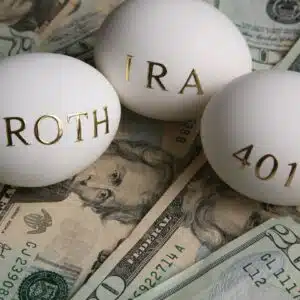Small business owners have many options when it comes to setting up a retirement plan for their business and employees. Previously, I had mentioned the SEP IRA as one of the more common choices.
Another option is the SIMPLE IRA. But don’t let the name fool you. When it comes to the rules of the SIMPLE IRA, I actually think it’s one of the most confusing when compared to the rest of the retirement plan options.
SIMPLE IRA stands for Savings Investment Match Plan for Employees. Oftentimes, I’ll refer to it as the “mini-401k,” as it’s traditionally used for employers with less than 100 employees. In addition to that, the administrative cost of a SIMPLE IRA for your employer is considerably much less than what a 401(k) would be.
If you are a business owner, here are some considerations if you are interested in opening a SIMPLE IRA for you and your employees.
What You Give to Your Employees Is Theirs-Immediately
In 401k plans, you are allowed to put a vesting schedule that requires the employee to work there for a certain number of years before they can take the money if they quit or get fired.
This is not the case with the SIMPLE IRA.
The day that you make a contribution to your employee’s account, the money is immediately theirs. If they want to cash it out, then they can, although they have to pay a pretty stiff penalty.
Employers Have to Match in a SIMPLE IRA
Each year, you are required to make a contribution to your SIMPLE IRA account, whether it be in the form of a match or what’s called a non-elected contribution. Matching contribution states that the employer has to match at least what you match.
So, if you’re matching 3%, the employer has to match 3% as well. Note that 3% is the most that the employer has to match, which could be considerably different than compared to a 401(k) or SEP IRA.
You do have the option to reduce the matching amount to 1% for two of a five-year period. That means if you do decide to do this, you have to match the full 3% for the remaining three of those five years. This aspect makes the SIMPLE IRA a little tricky and not quite that “simple.”
If you don’t want to worry about the match, then you can elect to make a non-elective contribution. This means that you will have to contribute 2% of your employee’s salary no matter what.
Remember:
Benefits of a SIMPLE IRA for Small Businesses
Despite its intricacies, a SIMPLE IRA can be an advantageous option for many small business owners. Firstly, it allows business owners to provide their employees with a retirement saving mechanism without incurring the high costs often associated with larger-scale retirement plans like the 401(k). This makes it especially attractive for smaller businesses on tighter budgets.
Moreover, a SIMPLE IRA is beneficial for employee retention. In today’s competitive job market, potential employees often consider the benefits package just as much as the salary offered. By providing a SIMPLE IRA, employers send a message that they care about their employee’s future and well-being. It can serve as a valuable tool for attracting and retaining quality talent.
Contribution Limits and Tax Advantages
It’s vital to understand the SIMPLE IRA contribution limits and tax advantages when considering this retirement plan option. As previously mentioned, employees can defer up to $16,000 annually. This amount might seem smaller compared to other retirement plan options, but it’s still a significant saving opportunity, especially for younger employees who have more years to contribute.
Tax-wise, the contributions made into a SIMPLE IRA are made pre-tax, meaning they reduce an employee’s taxable income for that year. As the funds grow, they do so tax-deferred. This allows for compound growth without the interference of annual taxes.
It’s only when distributions are taken during retirement that they become subject to income tax. For the business owner, providing a SIMPLE IRA can also offer tax deductions for the contributions made to the employee’s accounts.
The Employees Control the Investments
With most 401(k)s, you are limited to the investment options of the 401k provider. This is considerably different when compared to the SIMPLE IRA.
Being a self-employed retirement plan, the SIMPLE IRA gives you the discretion of what exactly you want your money invested into. If you want to buy 100 shares of XYZ stock, then you have the capability and freedom to do so. (Note: you are allowed to do this in a SEP IRA, too.)
Employees Can Defer, Too.
Employees, if they choose, can defer up to $16,000 per year into the SIMPLE IRA. You are currently allowed to contribute up to $16,000 per year in a SIMPLE IRA.
If they are over the age of 50, then they are allowed a catch-up contribution, which is $3,500. These are the same contribution limits as the business owner, as well. Please note that the $16,000 is far less than the $23,000 that you are eligible to contribute to a 401k.
No Borrowing Allowed
SIMPLE IRAs do not allow you to borrow as a 401k plan may. If they have to get money, they’ll have to pay tax and penalty, which is higher than most plans below.
The SIMPLE IRA Two-year Rule.
This is something that should definitely be noted within the SIMPLE IRA. Most retirement plans — 401(k)s, regular IRAs, Roth IRAs, etc. — have a 10% early withdrawal penalty if under the age of 59.5. But with the SIMPLE IRA, it takes it one step further.
If the SIMPLE IRA that you’ve started is less than two years old and you cash that out, instead of the normal 10% penalty, you will be subject to a 25% penalty in addition to ordinary income tax. That is a huge item to not be overlooked. Keep in mind as well that this doesn’t apply to just cashing it out.
If you were attempting to roll over your SIMPLE IRA into a rollover IRA, the 25% penalty would apply as well. The key point is just to wait two years before converting into either a regular IRA or cashing it out.
Choosing the Right Retirement Plan For Your Business
While the SIMPLE IRA is a valid option for many small businesses, it’s crucial to consider all available retirement plan options before deciding. Each business has unique needs, goals, and financial situations, which means what works for one might not be ideal for another.
For instance, if the contribution limits of the SIMPLE IRA seem restrictive, business owners might consider other options like the SEP IRA or even a 401(k). Moreover, the flexibility in investment choices provided by the SIMPLE IRA might be a double-edged sword; while it offers freedom, it can also be overwhelming for those unfamiliar with investing.
Ultimately, the right retirement plan will align with both the employer’s and employees’ financial goals and capacities. Seeking advice from a financial advisor or specialist in retirement planning can be invaluable in making this important decision.
Essentials of a SIMPLE IRA: A Comprehensive Overview for Business Owners and Employees
| Aspect | Details |
|---|---|
| Immediate Ownership | Contributions are Immediately Owned by Employees, Free from Vesting Schedules |
| Employer Contributions | Employers Must Contribute Annually, Opting for a 3% Match or a 2% Non-Elective Contribution |
| Benefits for Small Businesses | A Cost-Effective Retirement Option, Signaling Commitment to Employee Well-Being and Aiding Retention |
| Contribution Limits and Tax Advantages | Employees Can Defer $16,000 Annually, With Pre-Tax Contributions and Tax-Deferred Growth Until Retirement |
| Investment Control | SIMPLE IRA Provides Full Discretion in Choosing Investments for Both Business Owners and Employees |
| Employee Deferrals | Employees Can Defer up to $16,000 per Year, With a $3,500 Catch-Up for Those Over 50, Similar to Business Owners |
| No Borrowing Allowed | SIMPLE IRAs Prohibit Borrowing; Accessing Funds Incurs Tax and Penalty Consequences |
| The SIMPLE IRA Two-year Rule | Cashing Out or Rolling Over Within the First Two Years Incurs a 25% Penalty, Along With Ordinary Income Tax |
| Choosing the Right Plan | Consider Various Retirement Options (e.g., SEP IRA, 401(k)) Based on Limits, Flexibility, and Business Goals, Seeking Professional Advice |
The Bottom Line – Rules on Opening a SIMPLE IRA for Your Small Business
Choosing the right retirement plan for your small business is a pivotal decision that can impact both the financial well-being of your company and the retirement security of your employees. The SIMPLE IRA offers a unique blend of benefits tailored for smaller businesses, combining flexibility in investment choices with a less intensive administrative burden.
While its rules might seem intricate, its potential advantages in employee retention and cost-effectiveness can make it an attractive option. However, every business’s needs and circumstances vary, making it essential to assess all available options.
Engage in thorough research, perhaps even consulting with a financial advisor, to ensure that your chosen retirement plan aligns with your business goals and supports your employees’ future financial needs. By doing so, you not only safeguard the future of your business but also contribute to the long-term financial stability of those who help it thrive.







